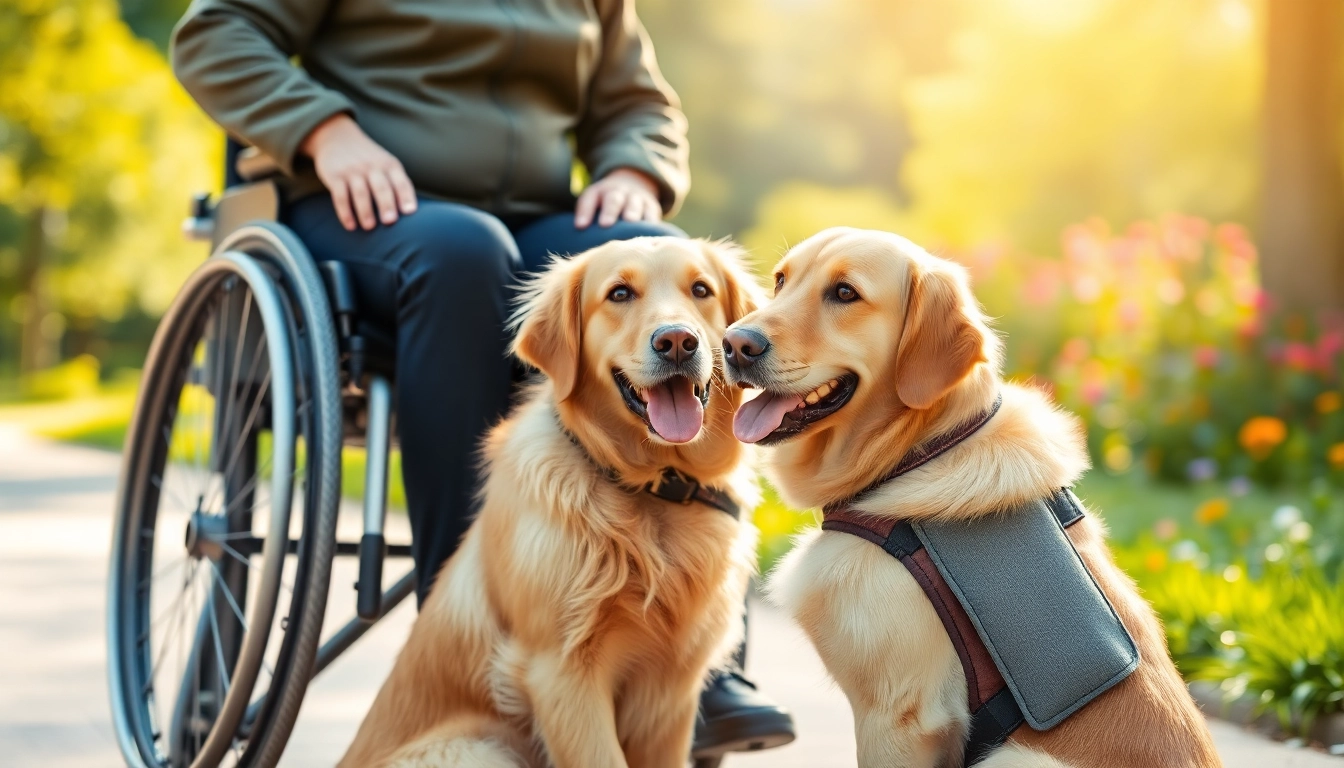Understanding the Role of Service Dogs
Definition and Types of Service Dogs
Service dogs are highly trained animals specifically tasked to assist individuals with disabilities, enhancing their quality of life and providing necessary support in daily tasks. Unlike standard pets, service dogs receive intensive training to learn how to perform specific tasks to aid their handler, whether it’s guiding the visually impaired, alerting individuals with hearing impairments to sound, or providing assistance to those with mobility challenges.
There are several types of service dogs, each trained to assist with particular disabilities:
- Guide Dogs: Trained to lead visually impaired individuals safely through their environment.
- Hearing Dogs: These dogs alert their handlers to sounds like doorbells, alarms, or the phone.
- Mobility Assistance Dogs: Trained to help individuals with physical disabilities navigate their surroundings, offering balance, retrieving items, or pulling wheelchairs.
- Medical Alert Dogs: These dogs are trained to alert their handler to medical conditions such as seizures or diabetes-related episodes.
- Emotional Support Animals: While not technically service dogs, these pets provide comfort and emotional support but do not have the same legal rights as service dogs.
- Psycho-Social Support Dogs: Trained to assist those with mental health conditions such as anxiety or PTSD through grounding exercises and alerts.
The Benefits of Having a Service Dog
Service dogs are not merely companions; they provide invaluable assistance that can lead to profound lifestyle changes. Here are some of the key benefits:
- Increased Independence: Many individuals find that service dogs grant them the ability to perform daily tasks that may have been difficult or impossible without assistance.
- Enhanced Mobility: Mobility service dogs can provide support for those with physical impairments, allowing them to move freely.
- Improved Mental Health: Service dogs offer companionship, reducing feelings of loneliness and anxiety, which is especially significant for individuals with mental health disorders.
- Increased Safety: These specially trained dogs can alert their owners to potential dangers, medical emergencies, or help prevent falls.
Common Disabilities Supported by Service Dogs
The range of disabilities that can benefit from service dogs is extensive. Common conditions include:
- Visual impairments and blindness
- Hearing impairments and deafness
- Mobility impairments, including paralysis, arthritis, and amputations
- Seizure disorders, such as epilepsy
- Panic disorders, PTSD, and severe anxiety
- Diabetes and other chronic medical conditions which require alerting
Finding Service Dogs for Sale
Where to Look for Service Dogs for Sale
Finding a qualified service dog can be challenging, particularly if you are looking for specific breeds or skill sets tailored to your needs. Some reliable sources for finding service dogs for sale include:
- Organizations Specializing in Service Dogs: Many nonprofit organizations focus on training and placing service dogs. These organizations may offer fully trained dogs or those ready for specialized training.
- Certified Breeders: Some breeders specialize in service dog breeds. It’s crucial to verify that they maintain ethical standards in breeding and training.
- Online Listings and Auctions: Various websites list service dogs available for sale, although caution is advised to avoid scams.
What to Consider When Purchasing a Service Dog
When looking to purchase a service dog, there are several essential factors to evaluate:
- Training and Certification: Ensure the dog has completion certificates for specific training programs that meet industry standards.
- Temperament: The dog should have a calm, stable temperament and should be sociable and responsive to commands.
- Health and Age: Verify vet records to confirm that the dog is healthy and up to date on vaccinations. Consider the age as it can reflect energy levels and longevity.
- Fit for Your Needs: Assess whether the dog has been trained for the specific tasks you require.
Adoption vs. Purchase: Pros and Cons
Choosing between adopting a service dog or purchasing one can depend on various factors, including budget, training, and personal preference. Here’s a breakdown of the pros and cons:
Adoption
- Pros: Lower cost, helping a dog in need, and potential for earlier training stages.
- Cons: Uncertainties regarding a dog’s background and behavior; may require additional training.
Purchase
- Pros: Guaranteed trained service dog that meets specific criteria and standards.
- Cons: Higher costs and the possibility of program delays before placement.
Training Service Dogs: An Essential Process
Overview of Training Programs
Training programs for service dogs can vary significantly based on the needs of the handler and the type of service dog. Most effective programs will cover a range of behavioral and task-oriented training, including:
- Basic Obedience: Essential commands such as sit, stay, come, and heel form the foundation of a service dog’s training.
- Advanced Task Training: This includes specific skills related to the handler’s disability, like alerting to sounds, retrieving items, or providing tactile stimulation.
- Public Access Training: This ensures that the service dog can behave appropriately in various situations, such as crowded areas or public transport.
Key Skills Service Dogs Are Trained For
Service dogs are trained for many essential tasks that directly benefit their handlers. Such skills may include:
- Guiding their handler around obstacles
- Bringing medication or a phone during emergencies
- Providing balance support when walking
- Disrupting harmful behaviors (e.g., self-harm) during mental health crises
Certification and Legal Considerations
Certification requirements for service dogs can vary by state and organization but are crucial for ensuring the legitimacy of the animal’s role. Here are a few pointers to consider:
- Look for organizations that comply with the Americans with Disabilities Act (ADA) standards.
- Service dogs should demonstrate obedience and appropriate behavior in public settings.
- Handlers are typically required to train with the dog to ensure compatibility and the dog’s ability to assist effectively.
Cost of Service Dogs for Sale
Factors Influencing the Price of Service Dogs
The cost of acquiring a service dog can vary widely based on several factors. These include:
- Training Level: Fully trained service dogs often require significant investment in terms of training and resources.
- Breed: Certain breeds are typically preferred for specific tasks and may carry higher price tags.
- Organization Reputation: Organizations with a solid track record may charge more for their services, reflecting quality training.
Financial Assistance Options Available
For those who may struggle with the costs associated with acquiring a service dog, various financial assistance programs may be available:
- Nonprofits and charitable organizations often provide grants or funding.
- Government programs may offer financial assistance for individuals with disabilities.
- Some trainers might have payment plans or sliding fee scales based on income.
Long-Term Costs of Caring for a Service Dog
While the initial investment in a service dog is significant, it’s essential to consider the ongoing costs, which may include:
- Routine veterinary care and vaccinations
- Specialized training refreshers if necessary
- Daily care costs such as food, grooming, and supplies
Success Stories: Transformative Impact of Service Dogs
Real-Life Testimonials from Service Dog Owners
The impact of service dogs on the lives of their handlers cannot be overstated. Numerous testimonials showcase the transformative changes individuals have experienced:
“My service dog allows me to thrive every day—she’s my eyes, my strength, and my emotional anchor.”
How Service Dogs Change Lives
Success stories consistently underline that service dogs enhance independence, reduce anxiety, and empower individuals to lead fuller lives. Many recipients highlight an increased sense of confidence and a significant reduction in isolation.
Communities Impacted by Accessible Service Dogs
Beyond individual benefits, the availability of service dogs fosters safer and more inclusive communities. Increased public awareness and understanding lead to improved accessibility and acceptance of service animals, thereby enhancing community integration for those with disabilities.



